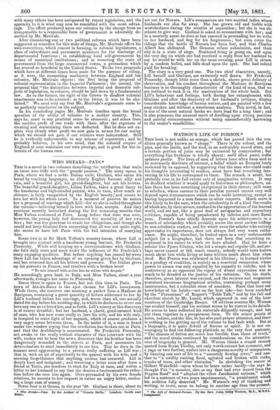WHO BREAKS—PAYS.* Tars is a novel in two volumes describing
the retribution that waits on those who trifle with the " grande passion." The story opens in Paris, where we find a noble Italian exile, Giuliani, who earns his bread by teaching languages, an elderly English baronet silly and vain, and a beautiful girl, his grand-daughter, but not his heiress. The beautiful grand-daughter, Lilian Tufton, takes a great fancy to the handsome and high-minded patriot, who in turn, aftei'much re- sistance, is fairly vanquished by the English beauty,: and comes to love her with his whole heart. In a moment of passion •he makes her a proposal of marriage which Lill—for so she is called throughout the volume—believing herself in love with him, accepts. And they continue secretly betrothed during the few remaining months that Miss Tufton continued at Paris. Long before that time was over, however, the young lady had discovered the unreality of her own love ; but was too generous to evade her obligations, and though she could not keep Giuliani from suspecting that all was not quite right, she seems to have left Paris with the full intention of marrying him.
Scene two is at Sir Mark Tufton's country-house, where Lill is brought into contact with a handsome young baronet, Sir Frederick Ponsonby. While still keeping up a correspondence with Giuliani, she falls daily more and more under the influence of Sir Frederick's many engaging qualities. But before anything has passed between them Lill has taken advantage of an opening given her by Giuliani, and has returned him all his letters and presents. The Italian gives up his pursuits in France, and resolves with a broken heart
"To mix himself with action lest he wither with despair."
He accordingly goes back to Italy, and Miss Tufton, about a year afterwards, changes her name to Ponsonby.
Scene three is again in France,-but not this time in Paris. The town of Aix-les-Bains is the spot chosen for Lill's honeymoon. While there, she receives one morning a packet from a Madame de Ravignan, containing a great quantity of letters addressed to her by Lill's husband before his marriage, and, worse than all, one actually dated the day before his wedding-day, in which he declares he never can love any one as lie loved her, and so forth. Lill's misery at this discovery is of course dreadful; but her husband, a placid, good-natured kind of man, who has now come really to love his wife, and his wife only, is tempted to make light of her anguish, which of course produces a very angry scene between them. In the midst of it, a man is heard under the window crying that the revolution has broken out at Paris, and that the Archbishop is assassinated. Sir Frederick Ponsonby, not awake to the really critical character of this iuterview with Ins wife, rushes out to hear the news, discovers that his brother has been dangerously wounded in the streets at Paris, and announces his determination to start immediately to see him. This he does in the manner most aggravating to a person really suffering as Lill was ; that is, with an air of superiority to the quarrel with his Wile, and a seeming forgetfulness that anything serious had occurred. Lill is deeply hurt and indignant ; and receiving a letter soon after from a friend at Turin, she resolves to start for Italy at once, and writes a letter to her husband to say that she desires a twelvemonth for reflec- tion before she sees him again. Over-persuaded by his own female relatives, lie assents to her request in rather an angry letter, enclos- ing a large sum of money.
Scene four is at Genoa, in the year '49. Giuliani is there, about to
• Who Bigots—Paya. By the Author of "Cousin Stella." London: Smith and Elder.
set ont for Novara. Lill's companions are two married ladies whose husbands are also far away. She has grown old and feeble with wretchedness during the months of separation; but she is too ob- stinate to give way. Giuliani is asked to remonstrate with her; and in a masterly scene he does at last succeed in persuading her to write to her husband, and beg for his forgiveness ; but soon come the tidings that the battle of Novara has been lost, and that Charles Albert has abdicated. The Genoese refuse submission, and their city is in a state of siege. Scattered firing is going on, and upon the very day on which she had received a reply from herhusband to say he would be with her on the same evemng, poor Lill is struck by a random bullet, and falls dead upon the spot. She had indeed paid for breaking.
The story is a very good one. The two chief characters, namely, Lill herself and Giuliani, are extremely well drawn. Sir Frederick Ponsonby, though little more than a sketch, shows great delicacy of observation, and his conduct throughout the Madame de Ravignan business is so thoroughly characteristic of the kind of man, that we are inclined to rank it as the masterpiece of the whole book. But Lill's behaviour and feelings, both during her entanglement with Giuliani and after the discovery of her husband's intrigue, display considerable knowledge of human nature, and arepainted with a few easy strokes and without a wearisome analysis. This novel, in fact, is one of the most natural books we have read for a long time; and it also possesses the unusual merit of dwelling upon strong passions and painful circumstances without being uncomfortably harrowing to the reader's sensibilities.






























 Previous page
Previous page